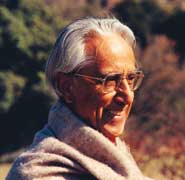




Ecumenical ecumenism
“When you enter into an intra-religious dialogue,
do not think beforehand about what you ought to believe.
When you give witness to your faith,
do not defend yourself to yourself nor defend your concrete interests,
however sacred they may see to you. (...)
Blessed are you when you uphold your convictions
and nonetheless, do not present them as absolute norms.
Woe to you, theologians and academics,
who belittle what others say
because you consider it embarrassing or insufficiently “scientific”! (...)
Woe to you, religious ones,
because you monopolize religion and suffocate the Spirit,
that blows where and as it wills!"
(“The Sermon on the Mount of Intrareligious Dialogue”, Journal of Ecumenical Studies, Philadelphia 4, 1985; en La nueva inocencia).Ecumenical ecumenism is a serene interrelationship and a dialogal interpenetration of all the paths that people believe will lead to the fullness or final destination of life” (La nueva inocencia).
Ecumenical dialogue is a constant in Panikkar from the beginning, being one of the theologians who worked on the declaration Nostra Aetate of the Second Vatican Council; Paul VI named him to the team of the Ecumenical Tantur Institute (Jerusalem). But in his conception of this ecumenical dialogue, RP attempts to go beyond inter-confessional ecumenism (among Christian confessions) to achieve an inter-religious ecumenism, an ecumenical ecumenism that seeks a relationship of mutual fecundation between the different religions in the ecumene.
Panikkar’s ecumenical ecumenism wishes to move away from mission – wanting to impose, vanquish or convince the other with arguments from my religion so that he might abandon his – toward dialogue, discovering the riches of the other (La transformación de la misión cristiana en diálogo, Madrid 1992). The intra-religious dialogue is more than inter-religious dialogue; it is a dialogue open to mutual enrichment, in which one is always open to learning from the believer of another religion, a dialogical dialogue that may move beyond the dialectical dialogue (The Intrareligious Dialogue, New York 1999).
Ecumenical ecumenism “does not entail a uniformity of opinions, but rather means a harmony of hearts”, and seeks “greater understanding, a corrective criticism, and a greater fecundation among the religious traditions” (La nueva inocencia). It wants to be a genuine, sincere, and enriching encounter between the different religions and religious traditions: it seeks an inclusive relationship among these, a relationship in which interdependence does not mean losing our own identities, but rather accepting that the identities of others can be complimentary to our own (Il dialogo intrarreligioso). It is a matter of a “peaceful interrelation and dialogal interpenetration of all those paths that people believe will lead to the fullness or final destination of life” (“Ecumenismo crítico”, La nueva inocencia). Panikkar calls it dharma-samanvaya: “Harmonization (convergence, meeting) of all the dharmas or religions... Samanvaya does not necessarily mean equality but carries the hope that the current cacophony might be transformed into a future symphony” (“Ecumenismo ecuménico”, La nueva inocencia).
In Panikkar, ecumenical ecumenism in an intra-religious dialogue, is transformed into the theological and existential attitude of all his theology.
official site